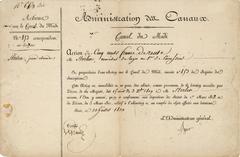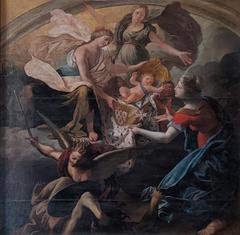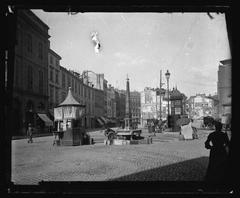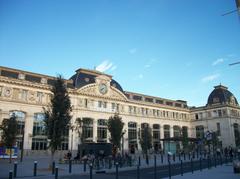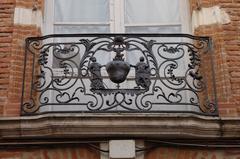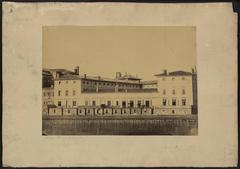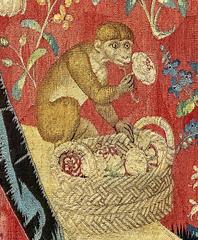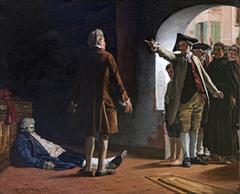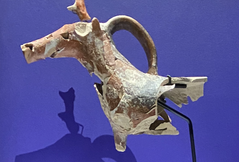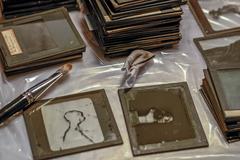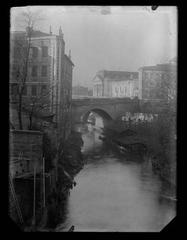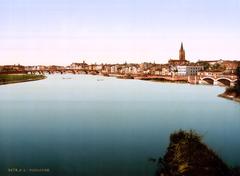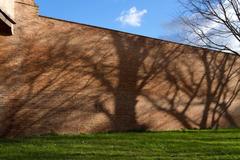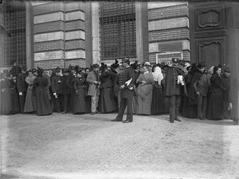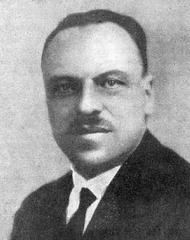Studium des Dominicains de Rangueil, Toulouse: Visiting Hours, Tickets, and Historical Site Guide
Date: 03/07/2025
Introduction
The Studium des Dominicains de Rangueil in Toulouse is a singular destination where centuries-old Dominican tradition meets post-war architectural innovation and vibrant community life. Established by the Dominican Order—whose presence in Toulouse dates back to the early 13th century—the Studium is today both a center for theological formation and a living testimony to the renewal of sacred space in modern France. With its protected status as a Monument Historique, the site invites visitors to explore its rich heritage, distinctive architecture, and ongoing spiritual and intellectual mission (Dominicains Toulouse, Wikipatrimoine, Gralon).
Whether you are a history enthusiast, architecture lover, spiritual seeker, or simply curious about Toulouse’s cultural treasures, this comprehensive guide details everything you need to know for a memorable visit to the Studium des Dominicains de Rangueil.
Table of Contents
- Origins and Historical Background
- Architectural and Artistic Significance
- Community Life and Educational Role
- Visiting Hours, Tickets, and Practical Information
- Travel Tips and Accessibility
- Participation in Religious Life
- Nearby Attractions
- Frequently Asked Questions (FAQ)
- Visuals and Media
- Summary and Visitor Tips
- Sources
Origins and Historical Background
The Dominican Presence in Toulouse
The Dominican Order’s roots in Toulouse date to 1215, when Saint Dominic and his companions established their first community, quickly becoming a keystone of the city’s spiritual and intellectual life. Early sites such as the Maison Pierre Seilhan and the famed Convent of the Jacobins—where the relics of Saint Thomas Aquinas are venerated—highlight the Order’s enduring influence (Dominicains Toulouse).
Through centuries of political upheaval, including periods of exile and return, the Dominicans persisted. The 19th and early 20th centuries saw renewals and relocations, with the Order eventually consolidating its Toulouse presence in the Rangueil district by the late 1950s.
Foundation of the Studium de Rangueil
The current complex, inaugurated in 1957, was conceived as a space for both theological study and community living. The merging of study houses from Saint-Maximin (Provence) and the former rue Vélane convent established Rangueil as a central Dominican studium, reaffirming Toulouse’s historic role in the Order’s academic and spiritual mission.
Architectural and Artistic Significance
Design and Construction
Built between 1954 and 1960, the Studium is a striking example of post-war sacred architecture. Architects Joachim and Pierre Génard, in collaboration with Jean Auproux, employed a unique blend of local river pebbles (galets) and raw concrete (béton brut), achieving both a sense of continuity with tradition and a modernist aesthetic (Wikipatrimoine, POP Culture).
The church, Notre-Dame du Rosaire, is characterized by a vast open nave supported by monumental concrete porticoes, creating an atmosphere at once solemn and inviting. The convent buildings feature distinctive “pare-soleil” sun-breakers, which provide both functional shade and a modern architectural profile.
Artistic Heritage
Artistic collaboration is central to the Studium’s identity. Abstract stained glass windows suffuse the church with colored light, while integrated ceramics and paintings soften the concrete interior. A historically protected organ, recognized as a heritage object, further enriches the liturgical and acoustic environment (Monumentum).
Heritage Status
Recognized as a Monument Historique since 2007, the Studium’s facades, roofs, and church nave are protected for their architectural and artistic value. The Association Veritas manages site preservation and public access, especially during events such as the European Heritage Days (POP Culture).
Community Life and Educational Role
Religious and Liturgical Life
The Studium’s daily rhythm is structured around communal prayer, study, and living according to the Dominican tradition. Public Masses, the Liturgy of the Hours, and periods of silent prayer are open to visitors, especially on Sundays and feast days (Dominicains Toulouse).
Theological Formation
A four-year theological curriculum, canonically recognized by the Institut Catholique de Toulouse, welcomes 15–18 student brothers each year. The program, rooted in Thomistic teaching, is directed by a team of Dominican professors (Dominicains Toulouse).
Cultural and Scholarly Activities
The Institut Saint-Thomas-d’Aquin (ISTA), established in 1995, hosts advanced research in Thomistic and medieval thought, while the Revue thomiste, published since 1957, stands as a leading journal in its field. The Studium’s library, rich in theology, philosophy, biblical studies, and history, is accessible to scholars by request (Dominicains Toulouse).
Visiting Hours, Tickets, and Practical Information
Opening Hours
- Public Worship and Visits: The church is generally open Monday–Saturday, 9:00 AM–6:00 PM; liturgical services are open to the public, especially on Sundays and major feast days.
- Guided Tours: Available by appointment or during special events such as the European Heritage Days (Dominicains Toulouse).
- Library Access: Available for scholars by prior arrangement.
Admission and Tickets
- Entry: Free for all public liturgies and self-guided visits; donations are appreciated.
- Guided Tours: May require advance booking and a small fee—check the official website for details.
Location and Access
- Address: Impasse Henri Lacordaire, 31400 Toulouse, France
- Public Transport: Metro Line B (stop: Rangueil), several bus lines, and proximity to key academic institutions.
- Parking: Limited; public transport is recommended.
- Accessibility: Main entrance and church are accessible; some internal areas have steps. Contact in advance for specific needs.
Facilities
- Church/Chapel: Open for services and prayer.
- Theological Library: Accessible by prior arrangement.
- Reception/Porterie: For inquiries and information.
Travel Tips and Accessibility
- Dress Code: Modest attire required; hats off inside the church.
- Conduct: Maintain silence, particularly during services; mobile phones on silent.
- Photography: Not permitted during services; permission required elsewhere.
- Languages: French is used primarily; some staff may speak English.
- Safety: The area is safe; standard precautions apply.
Participation in Religious Life
Visitors are welcome to join daily prayer, Mass, and special liturgies. Confessions are available Saturdays (16:30–18:30) and by request. Catechetical and formation sessions are offered primarily to parishioners and local students; inquiries are welcome.
Nearby Attractions
The Studium’s location in the Rangueil district places visitors close to:
- École nationale de l’aviation civile
- Institut national des sciences appliquées de Toulouse
- Rangueil Hospital
- Toulouse Saint-Agne and Empalot neighborhoods
- Other Toulouse landmarks: Basilica of Saint-Sernin, Capitole de Toulouse, Museum of Augustins (Mapcarta)
Frequently Asked Questions (FAQ)
Q: What are the opening hours?
A: Monday–Saturday, 9:00 AM–6:00 PM; public liturgies especially on Sundays and feast days. Confirm schedule on the official website.
Q: Is admission free?
A: Yes. Guided tours or special events may require booking.
Q: Are guided tours available?
A: By appointment or during special events.
Q: Is the Studium accessible for those with disabilities?
A: Yes, main areas are accessible; contact in advance for assistance.
Q: Can I take photos?
A: Not during services; otherwise, ask at the porterie.
Q: Is the library open to the public?
A: For scholars, by request.
Visuals and Media
For a preview, explore the Studium’s photo gallery and virtual tours on the official website. Recommended image alt texts for accessibility and SEO:
- “Studium des Dominicains de Rangueil church interior – Toulouse historical site”
- “Dominican brothers during midday Eucharistic celebration at Studium des Dominicains de Rangueil”
- “Map showing location of Studium des Dominicains de Rangueil in Toulouse”
Summary and Visitor Tips
The Studium des Dominicains de Rangueil is a unique intersection of spiritual tradition, intellectual pursuit, and modernist architecture. Free admission, accessible facilities, and opportunities for guided tours make it a welcoming site for all. Its proximity to other landmarks enhances its appeal as part of any cultural itinerary in Toulouse.
Plan your visit by consulting official resources, attending a liturgy, and exploring the site’s distinctive art and architecture. Enhance your experience with the Audiala app, follow the Studium on social media, and discover more of Toulouse’s rich heritage (Dominicains Toulouse, POP Culture, Monumentum).

